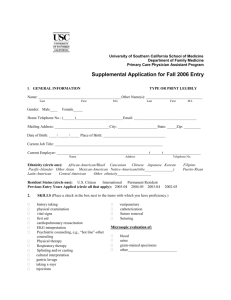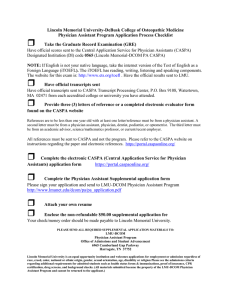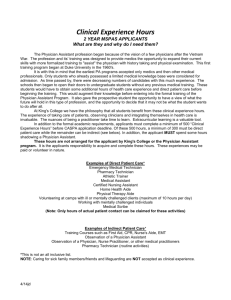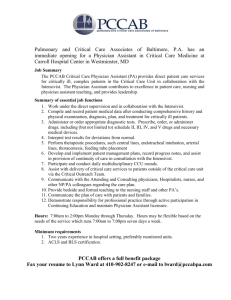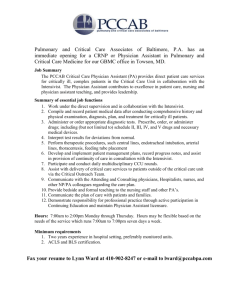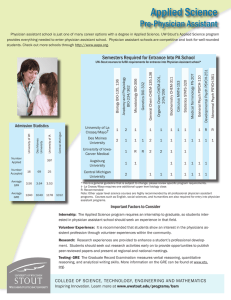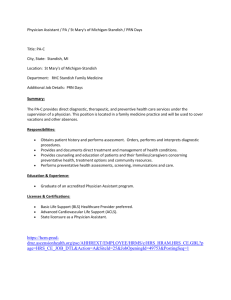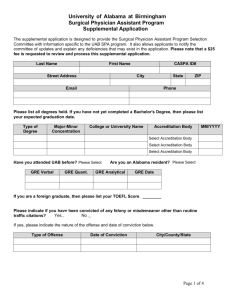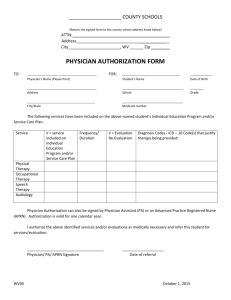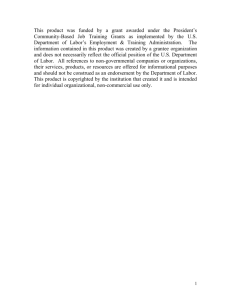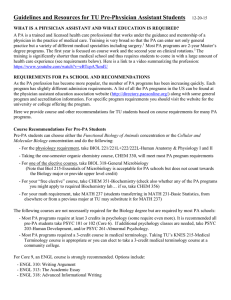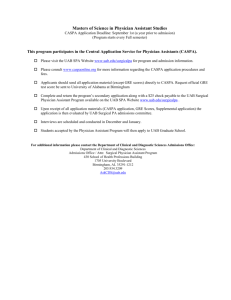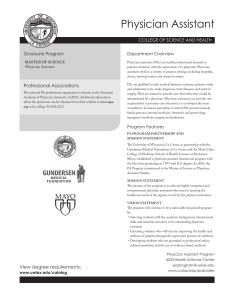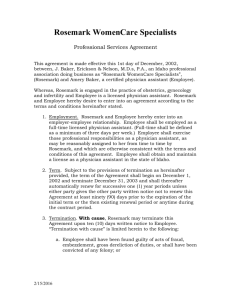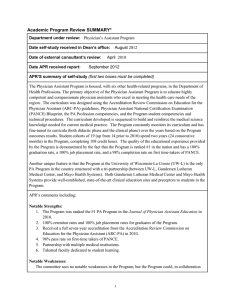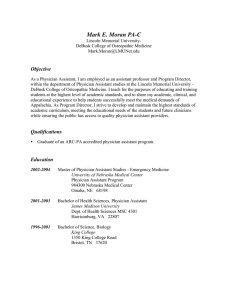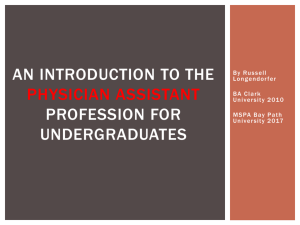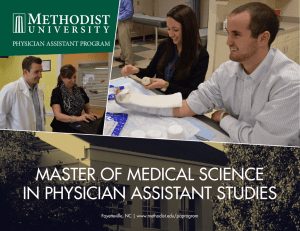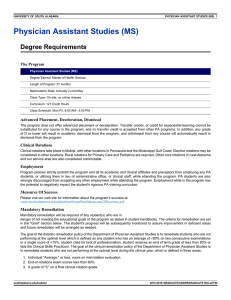Physician Assistant - University of Nevada, Reno
advertisement
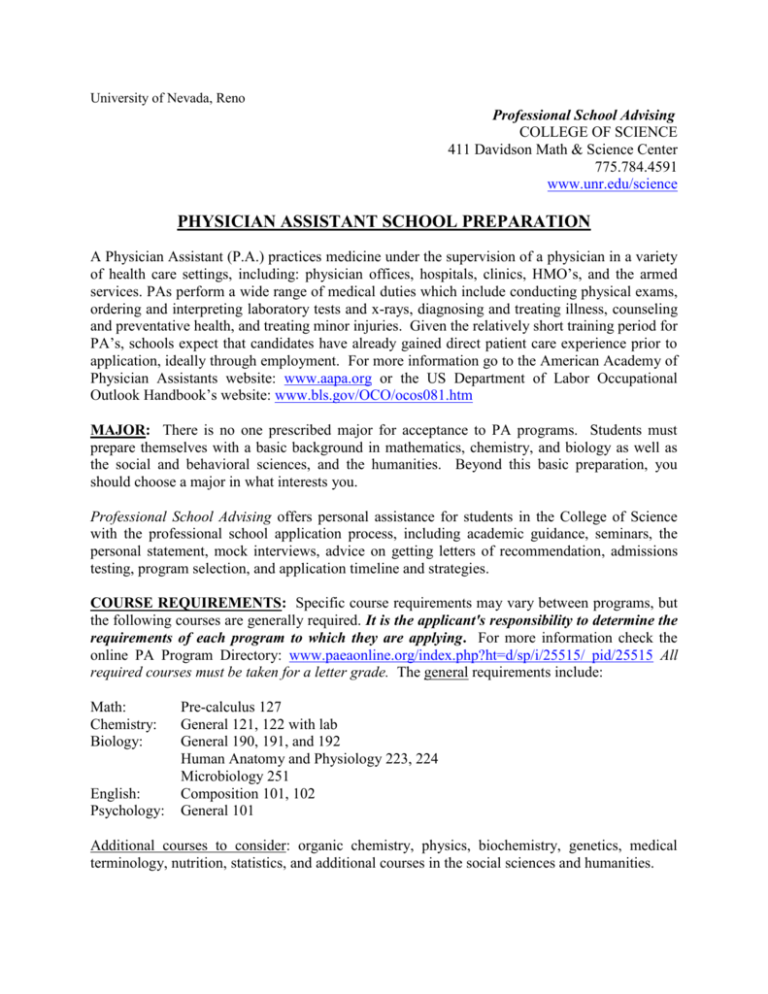
University of Nevada, Reno Professional School Advising COLLEGE OF SCIENCE 411 Davidson Math & Science Center 775.784.4591 www.unr.edu/science PHYSICIAN ASSISTANT SCHOOL PREPARATION A Physician Assistant (P.A.) practices medicine under the supervision of a physician in a variety of health care settings, including: physician offices, hospitals, clinics, HMO’s, and the armed services. PAs perform a wide range of medical duties which include conducting physical exams, ordering and interpreting laboratory tests and x-rays, diagnosing and treating illness, counseling and preventative health, and treating minor injuries. Given the relatively short training period for PA’s, schools expect that candidates have already gained direct patient care experience prior to application, ideally through employment. For more information go to the American Academy of Physician Assistants website: www.aapa.org or the US Department of Labor Occupational Outlook Handbook’s website: www.bls.gov/OCO/ocos081.htm MAJOR: There is no one prescribed major for acceptance to PA programs. Students must prepare themselves with a basic background in mathematics, chemistry, and biology as well as the social and behavioral sciences, and the humanities. Beyond this basic preparation, you should choose a major in what interests you. Professional School Advising offers personal assistance for students in the College of Science with the professional school application process, including academic guidance, seminars, the personal statement, mock interviews, advice on getting letters of recommendation, admissions testing, program selection, and application timeline and strategies. COURSE REQUIREMENTS: Specific course requirements may vary between programs, but the following courses are generally required. It is the applicant's responsibility to determine the requirements of each program to which they are applying. For more information check the online PA Program Directory: www.paeaonline.org/index.php?ht=d/sp/i/25515/ pid/25515 All required courses must be taken for a letter grade. The general requirements include: Math: Chemistry: Biology: English: Psychology: Pre-calculus 127 General 121, 122 with lab General 190, 191, and 192 Human Anatomy and Physiology 223, 224 Microbiology 251 Composition 101, 102 General 101 Additional courses to consider: organic chemistry, physics, biochemistry, genetics, medical terminology, nutrition, statistics, and additional courses in the social sciences and humanities. EXPERIENCE: Some PA programs require applicants have 500-2000 hours of direct, hands on patient care before applying. Some employment options: medical assistant, orderly, paramedic, certified nursing assistant, nurse, EMT, respiratory therapist, phlebotomist, home health aide. Research each program for specific requirements regarding the type of experience they will accept, and the number of hours required or recommended. PA EDUCATION: Because of the close working relationship PAs have with physicians, they are educated in a medical model designed to complement physician training. Currently, most PA programs are at the Master’s level. For more information go to Physician Assistant Education Association: www.paeaonline.org Generally, PA programs take 2.5 years: 9 to 12 months of classroom studies, followed by 9 to 15 months of supervised clinical rotations. PA’s can also do post graduate residencies and specialize in such areas as emergency medicine, neonatology and surgery. APPLICATION PROCESS: Applications should be submitted 12-15 months prior to expected enrollment in a PA program. Most PA programs belong to the Central Application Service for Physician Assistants (CASPA) which allows students to apply through one initial application. For more information go to www.caspaonline.org/ If you apply to schools which do not participate in CASPA, you will need to submit individual applications to each school. Most PA programs require that students take the Graduate Record Examination (GRE), a computerized test which is offered year round. For more information go to www.gre.org Secondary/Supplemental Applications: After receiving your initial application, some PA programs will send you their own application, known as a secondary or supplemental application. Interviews are the final stage of the application process. If a school offers you an interview it means they are seriously considering you. All schools interview potential matriculates. LETTERS OF RECOMMENDATION: Most programs require three letters of reference (LOR’s): from a health care provider with an advanced degree, an employer, and the third should be from a faculty member - science professors are preferred. Check the LOR requirement for each program to which you are applying. CASPA offers a Letters of Recommendation Service; for more information go to https://portal.caspaonline.org/applicants2013 /instruction /Reference_Forms.htm You may also consider storing your letters with a document collection and delivery service, such as Interfolio, where letters can be kept on file for up to 5 years and delivered to the programs you are apply to at your convenience. For more information go to www.Interfolio.com Selection for admission is based on many factors which may include undergraduate GPA, test scores, letters of recommendation, extracurricular activities, an interview, personal statement, and awareness of and experience in health related fields. 2/13
